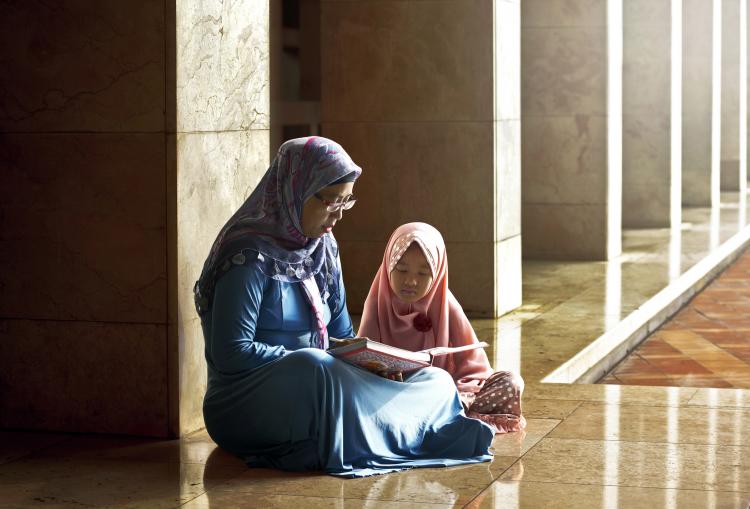
May 23: Moon, Venus, and Saturn Align
Three solar system bodies will line up in the sky and be visible to the naked eye—if we can get ourselves up early enough.
Milad un Nabi, also called Mawlid, Eid Milad ul-Nabi, or, simply, the Prophet's Birthday, is an occasion to celebrate the life of the prophet Muhammad. It is observed only by some Muslims.

Recounting stories about the life of prophet Muhammad is central to Mawlid.
©iStockphoto.com/leolintang
Sunni Muslims generally celebrate the Prophet's Birthday on the 12th day of Rabī‘ al-awwal, the third month of the Islamic calendar, while Shi'a Muslims observe it on the 17th day.
Muslims use a lunar calendar which differs in length from the Gregorian calendar used worldwide. This means the Gregorian date of Muslim holidays shifts slightly from one year to the next, falling about 11 days earlier each year.
The timing of Muslim months and holidays generally depends on the sighting of the Moon's crescent following New Moon. Because the Moon's visibility depends on clear skies and several other factors, we cannot predict the exact date of Muslim holidays with certainty.
Also, since the Moon is never visible in all world regions at once and current local dates can vary from one country to another, a holiday may fall on different dates according to a country's longitude and time zone. So, some Muslims may celebrate a holiday one day earlier than others, depending on their country or region of origin.
No, there are no bank holidays associated with Milad un Nabi in the United Kingdom, whether it is celebrated on the 12th or 17th day of Rabī‘ al-awwal. However, since the Gregorian date of Muslim holidays changes every year, Milad un Nabi can fall on other UK bank holidays.
In some British cities, Muslims hold processions on Milad un Nabi, so some roads may be temporarily closed. Mosques are likely to be busy and this may lead to some traffic congestion. Many Muslim businesses close on Milad un Nabi.
In the UK, the most visible tradition associated with Milad un Nabi are the processions held in some cities, usually featuring speeches by religious leaders about the life of Muhammad. While these events can have an openly celebratory character, they can also take on a more subdued mood in some Muslim communities because it is believed that this day marks not only the birth but also the death of Muhammad.
Muslim parents may tell their children about the life and work of Muhammad, focussing on his teachings and his importance as the founder of the Islamic faith. In some communities, events for children are organized where stories about Muhammad are recounted.
While some Muslims in the United Kingdom fast during daylight hours, some families hold Milad un Nabi feasts. It is common to recite special prayers, salutations, poems, or songs on this day to honor Muhammad. Some Muslims also mark Milad un Nabi by donating to charity.
In some communities, the celebrations may last for a week or even the whole month of Rabī‘ al-awwal.
Though Muhammad's exact date of birth is unknown, Muslims observe Milad un Nabi as his birthday celebration. In that sense, the holiday is similar to Christmas, which is observed on December 25 although it is unknown when Jesus was born—if he was indeed a historical figure, which is disputed.
According to the western calendar, Muhammad was born around 570 CE. He died on June 8, 632.
Read more about the Prophet's Birthday
Muhammad's birthday is generally celebrated by most UK Muslims. Both Sunni and Shi'a Muslims observe the event, albeit on different dates. Members of the Wahhabi, Salafi, Deobandi, and Ahmadiyya Muslim communities do not celebrate Milad un Nabi.
With nearly 2.8 million Muslims living in the United Kingdom, which equals about 4.8% of the population, Islam constitutes the second largest religion in the country, after Christianity. The largest Muslim community can be found in London. The municipalities of Bradford, Luton, Blackburn, Birmingham, and Dewsbury also have significant Muslim populations.
Note: Regional customs or Moon sightings may cause a variation of the date for Islamic holidays, which begin at sundown the day before the date specified for the holiday. The Islamic calendar is lunar and the days begin at sunset, so there may be one-day error depending on when the Crescent Moon is first seen.
| Year | Weekday | Date | Name | Holiday Type |
|---|---|---|---|---|
| 2020 | Thu | Oct 29 | Milad un Nabi (Mawlid) | Muslim |
| 2021 | Tue | Oct 19 | Milad un Nabi (Mawlid) | Muslim |
| 2022 | Sat | Oct 8 | Milad un Nabi (Mawlid) | Muslim |
| 2023 | Thu | Sep 28 | Milad un Nabi (Mawlid) | Muslim |
| 2024 | Mon | Sep 16 | Milad un Nabi (Mawlid) | Muslim |
| 2025 | Fri | Sep 5 | Milad un Nabi (Mawlid) (Tentative Date) | Muslim |
| 2026 | Wed | Aug 26 | Milad un Nabi (Mawlid) (Tentative Date) | Muslim |
| 2027 | Sun | Aug 15 | Milad un Nabi (Mawlid) (Tentative Date) | Muslim |
| 2028 | Thu | Aug 3 | Milad un Nabi (Mawlid) (Tentative Date) | Muslim |
| 2029 | Tue | Jul 24 | Milad un Nabi (Mawlid) (Tentative Date) | Muslim |
| 2030 | Sat | Jul 13 | Milad un Nabi (Mawlid) (Tentative Date) | Muslim |
While we diligently research and update our holiday dates, some of the information in the table above may be preliminary. If you find an error, please let us know.

Three solar system bodies will line up in the sky and be visible to the naked eye—if we can get ourselves up early enough.

In May, the Moon aligns with Venus and Saturn. Read more about May’s Moon events and what makes this month’s Full Moon special.

Discover the phases of the Moon in June 2025, including close approaches with Mars and Venus.

The spring bank holiday in the United Kingdom is on the last Monday of May each year.